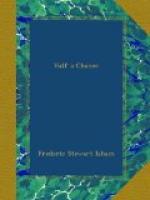The reader looked at this name, wrote a page or two, and inserted them. But his task seemed to afford him little satisfaction; his face wore an expression not remote from discouragement; none knew better than he the actual value, for his purpose, of the material before him. The chaff, froth, bubble of the case!—almost contemptuously he regarded it. Had he sought the unattainable? Certainly he had left no stone unturned, no stone, and yet the head and front of what he sought had ever escaped him—should he ever grasp it?—with these new secret activities menacing him?—harassing the future?
He drew himself up suddenly, as if to shake off momentary doubt or depression. Replacing his documents in the safe and locking it, he walked into a room adjoining; in a bare, square place on the wall hung foils and broadswords, and the only furnishings were the conventional appointments of a home gymnasium.
Here, having doffed his street clothes and assumed the scant costume of the athlete, for an hour or more he exercised vigorously, every muscle responding to its task with an untiring ease that told of a perfect system of training. As he stood in the glow, breathing deep and full, his figure, with its perfect lines of strength and litheness, the superb but not too pronounced swell of limb and shoulder, would have been the delight of the professional expounder of dumb-bells, bars and clubs, as the most proper medium of “fitness” and condition. Whether he exercised for the sake of exercising, or because bodily movement served to stimulate his mind in the consideration of problems of moment, John Steele certainly had never been in finer physical fettle than at this particular period of his varied and eventful career. Which proved of service to him and his well-being, for one night, not long thereafter, he was called upon to defend himself from a number of footpads who set upon him.
The episode occurred in his own street near a corner, where the shadows were black at an hour when the narrow way seemed silent and deserted. For a block or more footfalls had sounded behind him, now quickening, then becoming more deliberate, in unison with his own steps, as from time to time he purposely altered his pace. Once he had stopped; whereupon they too had paused. A moment he stood looking up at St. Paul’s, immense, ominous, casting at that late hour a dim patch of shadow over scores of pigmy buildings and paltry byways; when he went on, patter!—patter!—the trailing of feet, inevitable as fate, followed through the darkness. But they came no nearer until, abruptly wheeling, he entered the short street where his chambers were located; at the same time two men, apparently sauntering from the river in that side thoroughfare, approached him somewhat rapidly, separating slightly as they did so.




